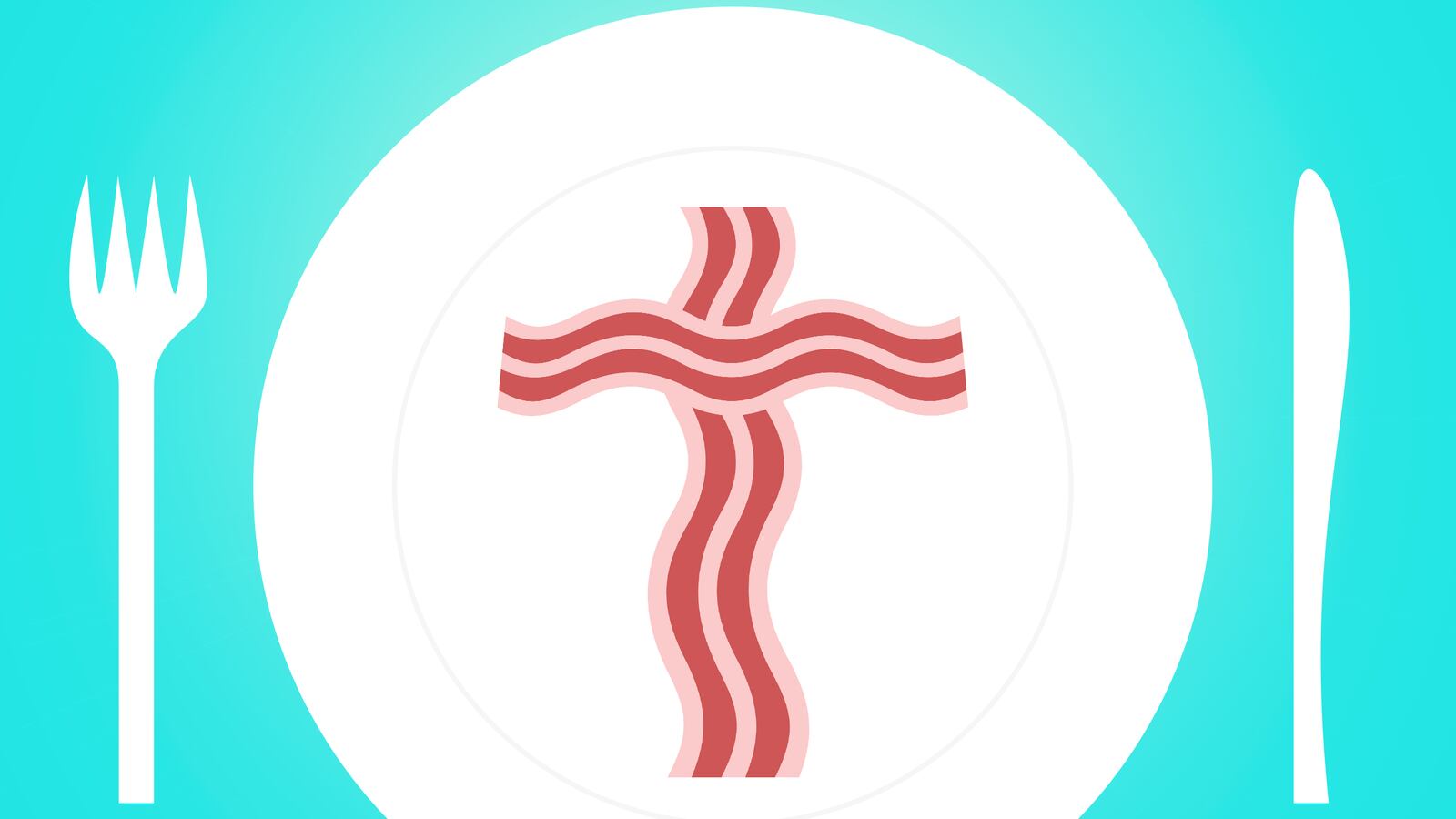Bacon. That’s how the attendees at Church Unlimited in Corpus Christie, Texas, are celebrating Father’s Day—by eating piles and piles of free bacon. It’s a two-day dad + bacon extravaganza called BaconFest—A Father’s Day Celebration.
And according to BaconFest.cc—a vanity splash page that redirects to Church Unlimited’s website—their Father’s Day celebration will be a bacon gorge unlike anything ever experienced in a 100-mile radius, an “aPORKalypse… meant to satisfy even the mightiest of hungers.”
Believe it or not, Church Unlimited isn’t the only evangelical congregation commemorating fatherhood today with an all-you-can-eat bacon feast. Despite God’s firm rebuke of eating pork in the Old Testament, churches all over the country—from Nashville to Chicago, from Maryland to California—are using bacon to lure fathers into their pews. The church in California even made a commercial featuring a woman dressed up as bacon.
But fried pig isn’t the only device churches are using to get dads through their doors. Churches are giving away grills. They’re hosting car shows. They’re filling their services with “manly stuff”. Last year, a church in Missouri gave away two AR-15 rifles on Father’s Day. The lengths to which churches go to attract dads to their services seemingly have few boundaries.
Though these promotional tactics are relatively new, churches acknowledging Father’s Day is not. In fact, the holiday pretty much started in the church. Though its organizers did not arrange their function as an annual celebration, the first known commemoration of fathers happened in a West Virginia church. In 1908, eight months after nearly 400 men died in a coal-mining explosion, a nearby United Methodist church decided to honor the fathers who died in that tragedy. The pastor preached a dad-themed sermon, one “etched in sadness as well as thanksgiving.”
Father’s Day as an annual holiday began to take shape two years later in Spokane, Wash., when Sonora Smart Dodd—one of six kids raised by a widowed father—began campaigning for an official Mother’s-Day equivalent that focused on fathers. Though her campaign moved slowly, Dodd rallied support for Father’s Day from churches, YMCAs, and other organizations. Though it didn’t become a nationally recognized holiday until 1972, by the 1930s, dads’ annual Sunday had already become a huge profits-driven commodity for retailers and was receiving harsh critique by those who were bewildered by its over commercialization. Critics were silenced during World War II when the holiday became another way that churches and communities supported their troops’ efforts emotionally. And though it would be another 30 years before Richard Nixon would make Father’s Day a nationally recognized celebration, by the end of the war it was, by all accounts, an American institution. Considering the holiday is always celebrated on Sunday, churches became natural environments in which to honor fathers.
But today, in addition to many evangelical churches using the third Sunday in June to celebrate fatherhood, among some flocks the holiday has become an easy opportunity for churches to try and coax men to give God’s house another try.
Unlike in days gone by when church pews still filled up on Sunday mornings with dads of all ages, polling suggests that men in America have grown disinterested in church. In fact, among researchers who study America’s religious habits, one of the most talked about trends over the last decade has been the ever-present reality that a growing number of men hate going to church.
Kevin D. Hendricks, the editorial director at Church Marketing Sucks, says, “People are always going on and on about church being too feminine and about how churches need to do more work to attract men.” He adds, “It’s pretty ironic, given the patriarchy of the church.”
But according to Hendricks, the assumption that men might be more willing to attend a “manly church” is the fuel that drives evangelicals to use bacon, car shows, and gun and grill giveaways as bait.
“Churches are willing to bend over backwards to get men through their doors. Mother’s Day is the third most popular Sunday of the year for churches—behind Easter and Christmas—while Father’s Day barely ranks.”
Nate Pyle, author of Man Enough and a pastor of Christ’s Community Church located outside of Indianapolis, agrees with Hendricks. “By making [Father’s Day] all about bacon, giving away guns, or bringing in the local sports hero, churches hope to attract men by proving that churches can be masculine. But these macho activities are simply acquiescing to cultural ideals gathering than letting the gospel shape what we say and do.”
Of his own church’s celebration of Father’s Day, Pyle says, “We will simply acknowledge fathers and pray for them. No pomp, no circumstance.”
Nadia Bolz-Weber, the pastor at the House for All Sinners and Saints in Denver, says that if she mentions Father’s Day at all, the focus won’t be a spiritual celebration.
“We may have a poem or something in the prayers that speaks aloud the terrible ambiguity of human experience around parenting and being parented,” she says, “[But we won’t be] contributing to that particularly absurd combination of sentimentality and consumerism that is Mother’s Day and Father’s Day.”
So… no bacon?






